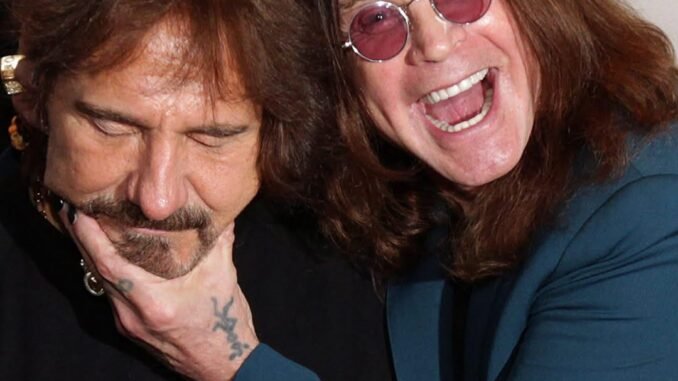
The Prince of Laughter: Geezer Butler Remembers Ozzy Osbourne
In a touching and unexpectedly tender essay, Black Sabbath bassist Geezer Butler has opened up about the man behind the myth—Ozzy Osbourne, his friend and bandmate of 57 years. While the world may know Ozzy as the “Prince of Darkness,” Butler writes of a very different man—one he affectionately calls “The Prince of Laughter.”
To Geezer, the Ozzy the public saw—the bat-biting wildman, the heavy metal icon cloaked in darkness—was only part of the story. The real Ozzy, he says, was a joker, a born entertainer who would do anything for a laugh. “He’d do anything for a laugh,” Geezer writes. “A born entertainer. He lived to make people smile—even if it meant making a fool of himself.”
Their legendary partnership began in Birmingham in 1968, a city still in the shadow of post-war industry and poverty. One day, as Geezer browsed a local music shop, a hand-scrawled note caught his eye: “Ozzy Zig Needs a Gig.” Curious, he jotted down the contact info and decided to check it out.
That first meeting has since become band lore, and the way Geezer tells it, it was as surreal as it was fateful. Ozzy wasn’t home when he first called round, but later that evening, there was a knock on the Butler family’s front door. What happened next was pure Ozzy.
“My brother answered it and said to me, ‘Hey, there’s something at the door asking for you,’” Geezer recalls. “I said, ‘What do you mean by something?’ He said: ‘You’ll see.’”
Standing there on the doorstep was Ozzy Osbourne. Not in a proper suit or with a guitar slung over his shoulder, but wearing his father’s brown work gown, a chimney brush on one shoulder, a shoe on a dog leash, and—most remarkably—no shoes on his bare feet.
“He said, ‘I’m Ozzy,’” Geezer writes. “After I’d stopped laughing, I said: ‘OK, you’re in the band.’”
And with that, the journey began. Four working-class kids from Birmingham—Geezer Butler, Tony Iommi, Bill Ward, and Ozzy Osbourne—formed Black Sabbath, and in doing so, changed the face of music forever.
Butler’s essay doesn’t dwell on the fame, the fortune, or the madness that would follow. Instead, he focuses on Ozzy the person—the friend who was as generous as he was unpredictable, as kind as he was chaotic. Ozzy, he says, had an extraordinary talent for making even the most miserable day bearable. On long, grim tours when tensions ran high, Ozzy would always find a way to defuse the mood—sometimes with a prank, sometimes with an outlandish outfit, and sometimes just with a look that reminded them all why they’d started this in the first place.
“People saw Ozzy as a wild man, but they missed the warmth,” Butler writes. “He was thoughtful in his own bizarre way. He never let fame take away his sense of humor or his connection to where we came from.”
Their relationship wasn’t always easy. Over the years, there were fallouts, public spats, and long periods of silence. But none of that, Butler says, ever really changed the foundation of their bond.
“In the end, we always found our way back to each other,” he writes. “It was like family—bigger than any disagreement.”
As Geezer looks back on their decades together, what he remembers most isn’t the chaos or the controversies. It’s the laughter. Whether they were playing packed stadiums or stuck in a tiny tour van, Ozzy could always find the absurdity in the moment. He could bring the room to tears with one of his stories—or just by walking in wearing something completely ridiculous.
“I’ve never met anyone who could make people laugh like Ozzy,” Geezer says. “He didn’t have to try. It was just in him. That’s what I’ll miss the most. Not the singer. Not the showman. But the friend who could turn a gloomy afternoon into something unforgettable with just a glance or a one-liner.”
Today, fans around the world remember Ozzy as a rock god, a pioneer, a legend. But Geezer Butler offers something deeper: a portrait of a man who, at his core, just wanted to make people happy. A man who never let go of the mischief and joy that defined him from that very first knock at the door.
“Ozzy wasn’t the Prince of Darkness to me,” Geezer concludes. “He was—and always will be—the Prince of Laughter.”
Let me know if you’d like this formatted for a blog post, memorial article, or something else.
Leave a Reply